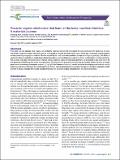| dc.contributor.author | Roh, Heejung | |
| dc.contributor.author | Cunin, Camille | |
| dc.contributor.author | Samal, Sanket | |
| dc.contributor.author | Gumyusenge, Aristide | |
| dc.date.accessioned | 2022-09-19T13:56:09Z | |
| dc.date.available | 2022-09-19T13:56:09Z | |
| dc.date.issued | 2022-09-16 | |
| dc.identifier.uri | https://hdl.handle.net/1721.1/145479 | |
| dc.description.abstract | Abstract
It has been over four decades since organic semiconducting materials were said to revolutionize the way we interact with electronics. As many had started to argue that organic semiconductors are a dying field of research, we have recently seen a rebirth and a major push towards adaptive on-body computing using organic materials. Whether assisted by the publicity of neuroprosthetics through technological giants (e.g., Elon Musk) or sparked by software capabilities to handle larger datasets than before, we are witnessing a surge in the design and fabrication of organic electronics that can learn and adapt at the physiological interface. Organic materials, especially conjugated polymers, are envisioned to play a key role in the next generation of healthcare devices and smart prosthetics. This prospective is a forward-looking journey for materials makers aiming to (i) uncover generational shortcomings of conjugated polymers, (ii) highlight how fundamental chemistry remains a vital tool for designing novel materials, and (iii) outline key material considerations for realizing electronics that can adapt to physiological environments. The goal is to provide an application-guided overview of design principles that must be considered towards next generation organic semiconductors for adaptive electronics.
Graphical abstract | en_US |
| dc.publisher | Springer International Publishing | en_US |
| dc.relation.isversionof | https://doi.org/10.1557/s43579-022-00269-3 | en_US |
| dc.rights | Creative Commons Attribution | en_US |
| dc.rights.uri | https://creativecommons.org/licenses/by/4.0/ | en_US |
| dc.source | Springer International Publishing | en_US |
| dc.title | Towards organic electronics that learn at the body-machine interface: A materials journey | en_US |
| dc.type | Article | en_US |
| dc.identifier.citation | Roh, Heejung, Cunin, Camille, Samal, Sanket and Gumyusenge, Aristide. 2022. "Towards organic electronics that learn at the body-machine interface: A materials journey." | |
| dc.contributor.department | Massachusetts Institute of Technology. Department of Mechanical Engineering | en_US |
| dc.identifier.mitlicense | PUBLISHER_CC | |
| dc.eprint.version | Final published version | en_US |
| dc.type.uri | http://purl.org/eprint/type/JournalArticle | en_US |
| eprint.status | http://purl.org/eprint/status/PeerReviewed | en_US |
| dc.date.updated | 2022-09-18T03:13:30Z | |
| dc.language.rfc3066 | en | |
| dc.rights.holder | The Author(s) | |
| dspace.embargo.terms | N | |
| dspace.date.submission | 2022-09-18T03:13:30Z | |
| mit.license | PUBLISHER_CC | |
| mit.metadata.status | Authority Work and Publication Information Needed | en_US |
